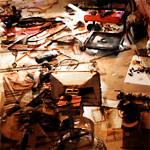 I’ve been redistributing the world around me piece by piece. The idea first occurred to me as a practical solution to the observation that I simply owned too many things. But for one as reclusive as I, the practice of divesting from material goods is fraught with difficulty, particularly when faced with the possibility of having to interact with people. Yet how is one to one rid oneself of extraneous possessions without resorting to arson?
I’ve been redistributing the world around me piece by piece. The idea first occurred to me as a practical solution to the observation that I simply owned too many things. But for one as reclusive as I, the practice of divesting from material goods is fraught with difficulty, particularly when faced with the possibility of having to interact with people. Yet how is one to one rid oneself of extraneous possessions without resorting to arson?
The answer was deceptively simple: I began leaving things behind. Each time I left my fortified penthouse suite I would bring along one item from my world, be it a small ceramic penguin given to me as a birthday present, a Babylonian battery I discovered at the back of my cupboard, or blood encrusted shackles hanging from my bedposts which I can’t remember how they got there at all.
Bear in mind that a certain level of artistry is required for this practice. For the most part these things, though they be redundant, obsolete, vestigial, do hold a certain sentimental value. They represent historical mementos, and therefore cannot simply be cast into alleyways or lobbed through the window of my annoying neighbor. To be sure, their destinations must be chosen swiftly, but thoughtfully. And this is precisely how I conducted my redistribution.
Each time I attended a restaurant or party, every time I visited an acquaintance or loved one, I would wait until I had a moment of privacy, and then I would remove a single object from my pocket and place it with great finesse. Initially I found ways to mingle my objects inconspicuously among stands of like objects. Or I would position them above or beyond the normal range of sight, on the tops of bookshelves, or just behind the toilet. But as I meditated on my actions I realized that I was neither paying proper respect to the objects, nor to their new environments. And furthermore, simple placement was not befitting my artistic station.
So I sought to refine my methodology. It was my belief that, with the proper skill, I should be able to camouflage my placements solely through a fine understanding of interior design. And, after a number of outright failures, including at least one instance of obviously naive complimentary juxtaposition, I began finally to master artful redistribution. In gaining an appreciation for the gestalt of a room, I discovered that I could drastically improve its appeal–molding its feng shui like so much warm clay–by the mere addition of a single well-placed heirloom.
Eventually I was creating soul-replenishing wombs of well-being wherever my meanderings took me, and people began to invite me to still more public outings. They were at a loss to describe why they felt so whole and fulfilled in my presence, but these outings presented me with the chance to hone my craft, and though my own home had grown almost empty in under a year, this didn’t prove to be a setback.
At about the same time my skill peaked, I found myself experiencing occasional, yet overpowering, kleptomaniacal tendencies. Every now and again I would redistribute the possessions of others rather than my own–but always with an eye on improving my surroundings. As my offenses grew in number, and as my desire for absolute discretion overshadowed all else, at heart my intentions remained pure. I felt a curious mix of shame and manifest destiny.
Now I find myself burdened both by conscience and by paraphernalia. My clothing, over time, has become a patchwork of cleverly constructed pockets, the better to conceal my displaced acquisitions. The ascetic in me is sickened by the jangling bulges that jut from my person like so many pilfered lesions. Indeed, it is perhaps ironic that I now possess more things than I ever have before, but I remain confident that I will be able to divest myself of it all, in time, once I have everything sorted out.